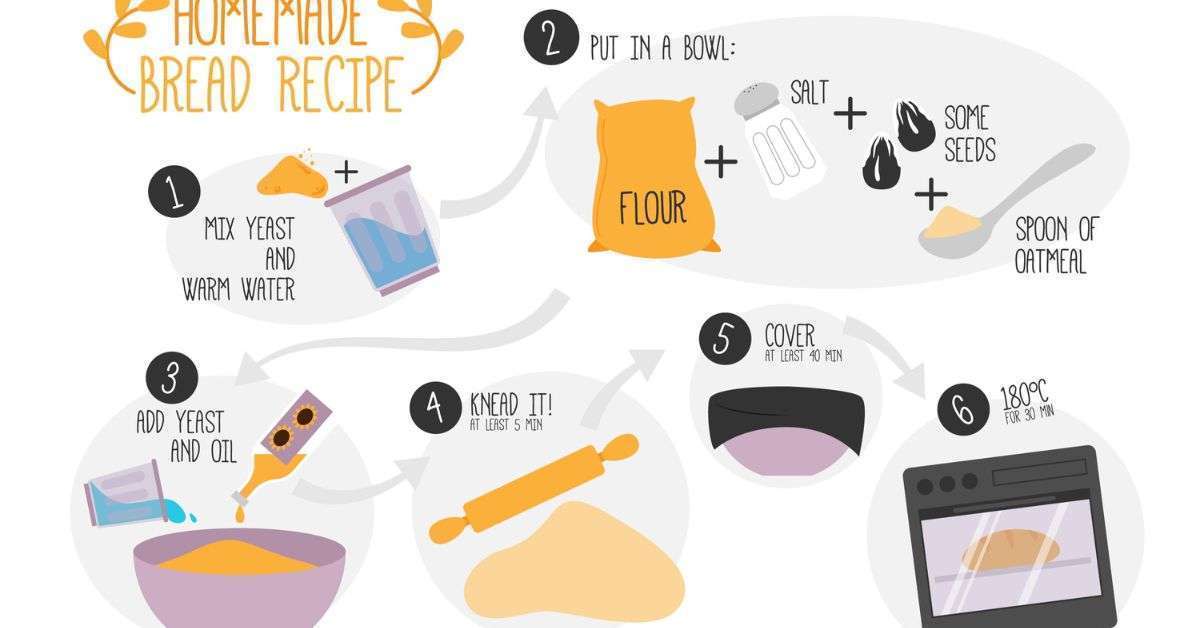Easy recipes for beginners are a great way to get started in the kitchen. Easy recipes are great for college students, busy parents, and novice cooks. They help you build confidence and develop your skills.
Also Read
The right recipes and some practice can help you impress your friends and family with great meals. One of the best things about easy beginner recipes is their few ingredients and simple techniques.
They are perfect for novice cooks with little kitchen experience.

Many easy recipes use common ingredients from your grocery store. So, you don’t have to hunt for hard-to-find items.
For busy weeknights, quick, easy meals. You may also need simple recipes to start cooking. There are many easy recipes for beginners to choose from.
With practice and patience, you can become a confident cook. You can create delicious meals that your family will love.
Understanding Ingredients of Easy Recipes for Beginners
Cooking can be intimidating for beginners, especially when it comes to understanding ingredients. Here are some key ingredients to stock up on and how to use them:
Basic Pantry Staples
Having a well-stocked pantry is essential for any home cook, especially beginners. Here are some basic pantry staples that can be used in a variety of recipes:
- Flour: All-purpose flour is the most versatile type of flour and can be used for baking, breading, and thickening sauces.
- Sugar: Granulated sugar is the most commonly used sugar in recipes and can be used for baking, sweetening drinks, and making sauces.
- Salt: Kosher salt is the most versatile type of salt and can be used for seasoning meat, vegetables, and sauces.
- Oils: Olive oil, vegetable oil, and canola oil are all good options for cooking and baking.
- Broth or stock: Chicken, beef, or vegetable broth can be used as a base for soups, stews, and sauces.
- Canned tomatoes: Diced or crushed canned tomatoes are a great base for pasta sauces and soups.
Spices and Herbs
Spices and herbs can add flavor and depth to any dish. Here are some essential spices and herbs to have in your pantry:
- Garlic: Fresh garlic adds a pungent, savory flavor to dishes. Minced garlic can be used in sauces, marinades, and dressings.
- Onion powder: Onion powder is a versatile spice that can be used in rubs, marinades, and sauces.
- Paprika: Paprika adds a sweet and smoky flavor to dishes and can be used in rubs, marinades, and sauces.
- Cumin: Cumin adds a warm, earthy flavor to dishes and is commonly used in Mexican and Indian cuisine.
- Basil: Fresh or dried basil adds a sweet and slightly peppery flavor to dishes and is commonly used in Italian cuisine.
- Oregano: Fresh or dried oregano adds a slightly bitter and pungent flavor to dishes and is commonly used in Mediterranean and Mexican cuisine.
Fresh Produce
Fresh produce is essential for adding flavor, texture, and nutrition to dishes. Here are some common fruits and vegetables to keep on hand:
- Onions: Onions add flavor and texture to dishes and can be used in soups, stews, and sauces.
- Carrots: Carrots add sweetness and texture to dishes and can be used in soups, stews, and salads.
- Celery: Celery adds a crunchy texture and mild flavor to dishes and can be used in soups, stews, and salads.
- Tomatoes: Tomatoes add sweetness and acidity to dishes and can be used in salads, sauces, and soups.
- Lemons: Lemons add a bright, acidic flavor to dishes and can be used in dressings, marinades, and sauces.
- Garlic: Fresh garlic adds a pungent, savory flavor to dishes and can be used in sauces, marinades, and dressings.
By stocking up on these basic ingredients, beginners can start experimenting with different recipes and flavors.
Essential Kitchen Tools for Easy Recipes for Beginners Dinner

When it comes to cooking, having the right tools can make all the difference. For beginner cooks, it can be overwhelming to figure out which kitchen tools are essential and which ones are not.
Here are some essential kitchen tools that every beginner cook should have:
Knives
A good set of knives is essential for any cook. A chef’s knife, a paring knife, and a serrated knife are the three basic knives that every beginner cook should have.
A chef’s knife is perfect for chopping vegetables and meat, a paring knife is great for peeling and slicing fruits and vegetables, and a serrated knife is perfect for slicing bread and tomatoes.
Cutting Board
A cutting board is necessary for any cook. A wooden or plastic cutting board is the best option for beginners. It is important to have a separate cutting board for meat and vegetables to avoid cross-contamination.
Pots and Pans
A beginner cook should have a few basic pots and pans. A non-stick pan is great for cooking eggs and pancakes, a stainless steel pan is perfect for searing meat and sautéing vegetables, and a saucepan is great for boiling water and making sauces.
Mixing Bowls
Mixing bowls are necessary for any cook. A set of mixing bowls in different sizes is perfect for mixing ingredients and storing leftovers.
Measuring Cups and Spoons
Measuring cups and spoons are essential for any beginner cook. It is important to have accurate measurements when cooking and baking.
Utensils
A beginner cook should have a few basic utensils. A spatula is great for flipping pancakes and eggs, a wooden spoon is perfect for stirring sauces and soups, and tongs are great for flipping meat and vegetables.
Having these essential kitchen tools will make cooking easier and more enjoyable for any beginner cook.
Basic Cooking Techniques

Cooking can be a daunting task for beginners, but with some basic cooking techniques, anyone can whip up delicious meals in no time. Here are some fundamental techniques that every beginner should know.
Boiling and Simmering
Boiling and simmering are two of the simplest and most common cooking techniques. Boiling is the process of heating water until it reaches its boiling point while simmering is the process of heating liquid to a temperature just below boiling.
Boiling is often used to cook pasta, vegetables, and eggs, while simmering is ideal for making soups, stews, and sauces.
To boil or simmer, fill a pot with enough water or liquid to cover the food you want to cook. Heat the pot over medium-high heat until the liquid reaches the desired temperature.
To simmer, reduce the heat to low and let the liquid gently bubble.
Baking
Baking is a dry heat cooking method that is ideal for cooking bread, cakes, and pastries. To bake, preheat the oven to the desired temperature and place the food on a baking sheet or in a baking dish. Bake the food until it is cooked through and golden brown.
When baking, it’s important to measure ingredients accurately and follow the recipe instructions carefully. Baking is a science, and even small changes in ingredients or measurements can affect the outcome of the dish.
Grilling
Grilling is a cooking technique that involves cooking food over an open flame or hot coals. Grilling is ideal for cooking meat, fish, and vegetables and can add a smoky flavor to the food.
To grill, preheat the grill to the desired temperature and place the food on the grill grates. Cook the food until it is cooked through and has grill marks on both sides.
Sauteing
Sauteing is a cooking technique that involves cooking food quickly in a small amount of oil or butter over high heat. Sauteing is ideal for cooking vegetables, meat, and seafood and can be used to make stir-fries, omelets, and more.
To saute, heat a small amount of oil or butter in a pan over high heat. Add the food to the pan and cook it quickly, stirring frequently, until it is cooked through and golden brown.
By mastering these basic cooking techniques, beginners can create a variety of delicious meals with ease.
Easy Breakfast Recipes
Starting the day with a nutritious breakfast is important for maintaining energy levels and concentration throughout the day. Here are some easy breakfast recipes that beginners can try out.
Scrambled Eggs
Scrambled eggs are a classic breakfast dish that can be made in minutes. To make scrambled eggs, crack 2-3 eggs into a bowl and whisk them with a fork. Heat a non-stick pan over medium heat and add a tablespoon of butter or oil.
Pour the eggs into the pan and use a spatula to stir the eggs gently as they cook. Once the eggs are cooked to your liking, season them with salt and pepper and serve.
Pancakes
Pancakes are another easy breakfast recipe that beginners can try out. To make pancakes, mix 1 cup of flour, 2 tablespoons of sugar, 2 teaspoons of baking powder, and a pinch of salt in a bowl.
In another bowl, whisk together 1 egg, 1 cup of milk, and 2 tablespoons of melted butter. Pour the wet ingredients into the dry ingredients and mix until just combined. Heat a non-stick pan over medium heat and add a tablespoon of butter.
Pour ¼ cup of batter into the pan for each pancake and cook until bubbles form on the surface. Flip the pancake and cook until golden brown.
Smoothies
Smoothies are a quick and easy breakfast option that can be made in a blender. To make a smoothie, combine 1 cup of frozen fruit, 1 cup of liquid (such as milk or juice), and ½ cup of yogurt in a blender.
Blend until smooth and pour into a glass. For added nutrition, consider adding spinach, kale, or protein powder to the smoothie.
These easy breakfast recipes are perfect for beginners who are looking to start their day with a nutritious and delicious meal.
Simple Lunch Recipes
When it comes to quick and easy lunch ideas, there are plenty of options for beginners. From sandwiches to salads to soups, there are simple recipes that can be made in no time.
Here are some ideas for simple lunch recipes that are perfect for beginners.
Sandwiches
Sandwiches are a classic lunch option that can be made in many different ways. Here are some simple sandwich ideas that are perfect for beginners:
- Grilled Cheese: This classic sandwich is easy to make and always satisfying. Simply butter two slices of bread, add cheese in the middle, and grill until the cheese is melted and the bread is golden brown.
- Turkey and Cheese: For a healthier option, try a turkey and cheese sandwich. Simply layer turkey, cheese, lettuce, and tomato on bread and enjoy.
- Peanut Butter and Jelly: This simple sandwich is a classic for a reason. Spread peanut butter and jelly on bread and enjoy.
Salads
Salads are a healthy and refreshing lunch option that can be made in many different ways. Here are some simple salad ideas that are perfect for beginners:
- Caesar Salad: This classic salad is easy to make and always delicious. Simply mix romaine lettuce, croutons, Parmesan cheese, and Caesar dressing.
- Caprese Salad: For a simple and refreshing salad, try a Caprese salad. Simply layer sliced tomatoes, fresh mozzarella, and basil leaves on a plate and drizzle with olive oil and balsamic vinegar.
- Greek Salad: This flavorful salad is easy to make and packed with healthy ingredients. Simply mix chopped lettuce, tomatoes, cucumbers, red onions, feta cheese, and olives, and drizzle with olive oil and lemon juice.
Soups
Soups are a comforting and filling lunch option that can be made in many different ways. Here are some simple soup ideas that are perfect for beginners:
- Tomato Soup: This classic soup is easy to make and always satisfying. Simply sauté onions and garlic in a pot, add canned tomatoes, chicken broth, and seasonings, and simmer until the flavors are blended.
- Chicken Noodle Soup: For a comforting and hearty soup, try chicken noodle soup. Simply sauté onions and garlic in a pot, add chicken broth, diced chicken, carrots, celery, and noodles, and simmer until the noodles are cooked.
- Vegetable Soup: This healthy and flavorful soup is easy to make and packed with veggies. Simply sauté onions and garlic in a pot, add chicken or vegetable broth, chopped vegetables, and seasonings, and simmer until the vegetables are tender.
Effortless Dinner Recipes
When it comes to cooking dinner, beginners might feel intimidated by the thought of spending hours in the kitchen.
However, there are plenty of easy and delicious recipes that can be made in no time. Here are three effortless dinner recipes that are perfect for beginners:
Pasta
Pasta is a classic and easy dinner option that can be made in a variety of ways. One of the simplest ways to make pasta is to cook it according to the package instructions and then toss it with olive oil, garlic, and Parmesan cheese.
For a heartier meal, add some cooked chicken or shrimp and some vegetables like broccoli or cherry tomatoes.
Chicken Stir Fry
Stir fry is a quick and easy way to make a healthy and delicious dinner. Start by cooking some chicken in a pan with some oil and garlic.
Once the chicken is cooked through, add some chopped vegetables like bell peppers, onions, and carrots. Toss everything together with some soy sauce and serve over rice.
Baked Fish
Baked fish is a healthy and easy dinner option that can be made in no time. Start by seasoning some fish fillets with salt, pepper, and lemon juice. Place the fillets in a baking dish and top with some sliced tomatoes and onions.
Bake in the oven for 20-25 minutes until the fish is cooked through. Serve with some steamed vegetables or a side salad.
Overall, these three dinner recipes are perfect for beginners who want to make a delicious meal without spending hours in the kitchen. With a few simple ingredients and some basic cooking techniques, anyone can make a tasty and satisfying dinner.
Quick Snacks
When it comes to quick snacks, there are plenty of options that beginners can try. Here are a few ideas that require minimal prep time and are perfect for satisfying hunger pangs in between meals.
Fruit Salads
Fruit salads are a healthy and refreshing snack that can be made in a matter of minutes. Simply chop up your favorite fruits, mix them together, and enjoy.
Beginners can start with simple combinations like apples and bananas or strawberries and blueberries. For a more filling snack, add some nuts or seeds to the mix.
Here is an example of a simple fruit salad recipe:
| Ingredients |
|---|
| 1 apple |
| 1 banana |
| Handful of blueberries |
| Handful of almonds |
- Chop the apple and banana into bite-sized pieces.
- Add the blueberries and almonds to the bowl.
- Mix everything together and serve.
Homemade Popcorn
Popcorn is a classic snack that can be made easily at home. All you need is a bag of popcorn kernels and a microwave-safe bowl with a lid.
Simply pour the kernels into the bowl, cover with the lid, and microwave for a few minutes until the popping stops. Season with salt or other spices for added flavor.
Here is a recipe for homemade popcorn:
| Ingredients |
|---|
| 1/4 cup popcorn kernels |
| 1 tablespoon oil |
| Salt to taste |
- Add the popcorn kernels and oil to a microwave-safe bowl with a lid.
- Cover the bowl with the lid and microwave for 2-3 minutes or until the popping stops.
- Season with salt or other spices and enjoy.
Yogurt Parfaits
Yogurt parfaits are a delicious and healthy snack that can be customized to suit your taste preferences. Simply layer yogurt, fruit, and granola in a glass or bowl for a satisfying snack that can be eaten on the go.
Here is a recipe for a simple yogurt parfait:
| Ingredients |
|---|
| 1 cup plain yogurt |
| Handful of strawberries |
| Handful of blueberries |
| 1/4 cup granola |
- Spoon a layer of yogurt into a glass or bowl.
- Add a layer of strawberries and blueberries on top of the yogurt.
- Sprinkle a layer of granola on top of the fruit.
- Repeat the layers until the glass or bowl is full.
- Serve and enjoy.
Overall, these quick snacks are perfect for beginners who are looking for easy and healthy snack options. With a little bit of creativity, beginners can customize these snacks to suit their taste preferences and dietary restrictions.
Conclusion
In conclusion, cooking can be a fun and rewarding experience for beginners. With the right tools and recipes, anyone can become a skilled cook in a short time.
Start with easy recipes. They should teach basic techniques like stir-frying, broiling, and glazing. These are ways to cook chicken while it roasts.
Beginners should also consider meal planning to save time and money. Meal planning avoids last-minute trips to the store. It ensures that they have all the ingredients.
Moreover, beginners should be bold and experiment with new ingredients and flavors. Trying new things can help them find new favorite dishes and broaden their tastes.
Finally, it would help if you remembered that cooking is a learning process. No one becomes a master chef overnight, and mistakes are bound to happen.
Anyone can become a skilled cook with patience, practice, and the right resources.





Your point of view caught my eye and was very interesting. Thanks. I have a question for you. https://accounts.binance.com/lv/register-person?ref=B4EPR6J0